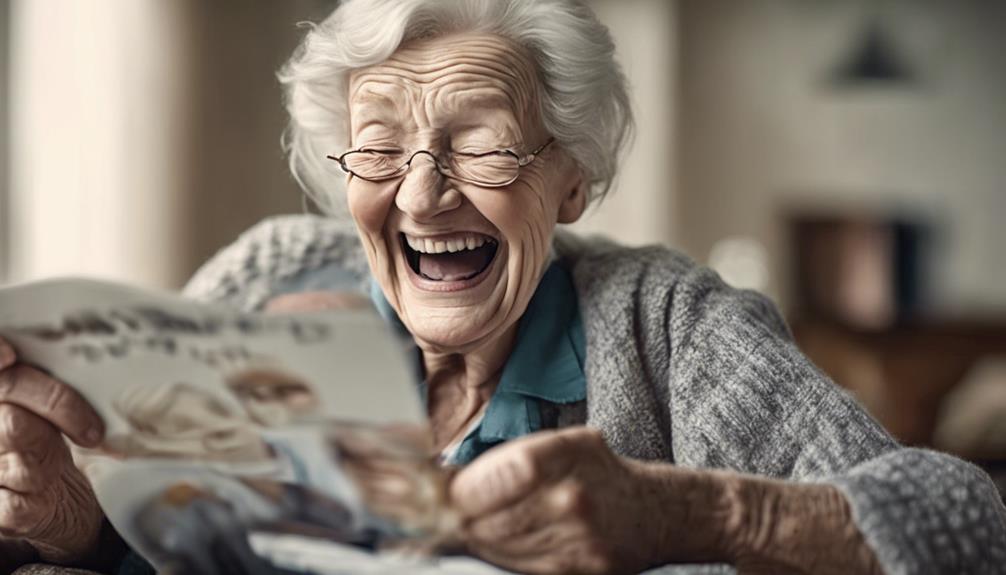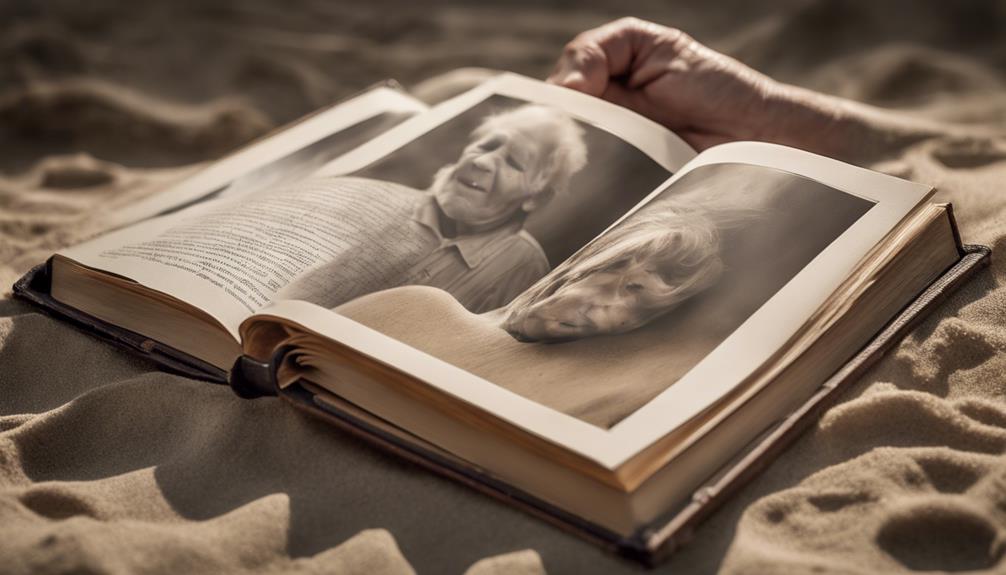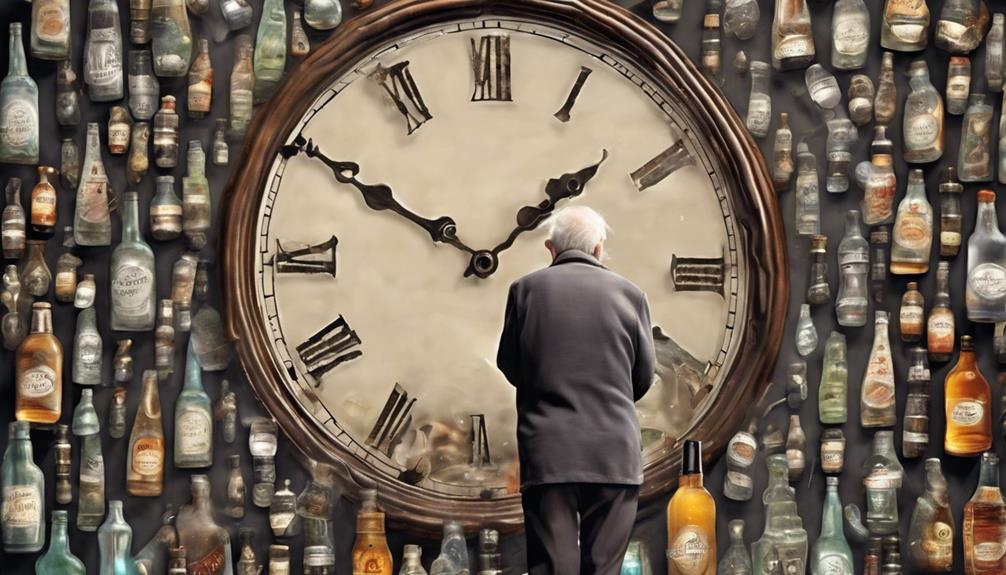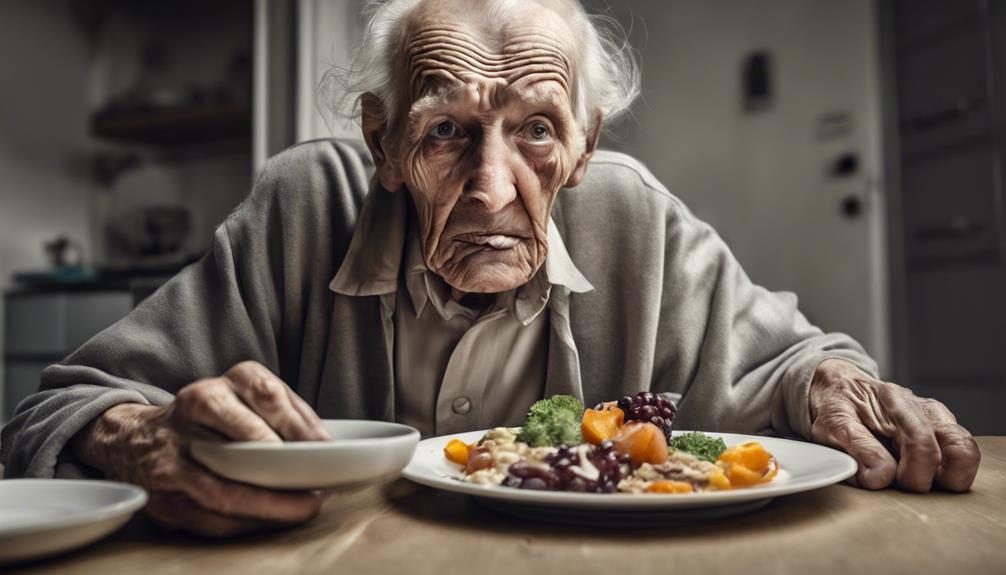Similar to an incomplete jigsaw puzzle, the realm of dementia memes provides a peek into a space where humor teeters on the brink of intricacy. Delving into the complex layers of these memes reveals a mixture of creativity, cleverness, and reminiscence, igniting captivating discussions and contemplations.
As we navigate this landscape, the question arises: how do dementia memes influence our perceptions of aging, memory loss, and humor itself? Let's unravel the threads of this intriguing tapestry, where laughter meets contemplation in unexpected ways, inviting us to ponder the power of humor in the face of cognitive challenges.
Key Takeaways
- Dementia memes foster empathy and humanize caregiving experiences.
- Balancing humor with sensitivity and dignity is a crucial challenge.
- Memes have positive impacts on awareness and community support.
- Future trends focus on collaboration, awareness, and technological advancements.
The Rise of Dementia Memes
The emergence of dementia memes has surged in popularity across social media platforms, notably TikTok, reflecting a growing trend in showcasing comedic and relatable caregiving situations. Content creators such as hospicenursepenny and nurse.johnn have captured significant views and engagement through their dementia meme videos.
These memes often center around nurse humor, experiences in nursing homes, and the difficulties faced in elderly caregiving. Visual elements such as emojis and editing tools like MemeCut are commonly employed to amplify the humor and relatability of dementia meme content. Hashtags like #dementia, #nursehumor, and #sundowners are used to categorize and enhance the visibility of dementia meme videos on TikTok.
The rise of dementia memes not only entertains but also sheds light on the challenges and experiences encountered in caregiving, fostering a sense of community and understanding among caregivers and those impacted by dementia.
Impact on Public Perception

Transitioning from the rise of dementia memes, the impact on public perception is a crucial aspect to consider in evaluating the societal influence of this trend. Dementia memes, particularly on platforms like TikTok, offer a unique perspective on caregiving and nursing home experiences, presenting them in a light-hearted manner. By humanizing dementia patients and caregivers, these memes play a significant role in fostering empathy and understanding within the public sphere.
Through humor and relatability, they've the potential to destigmatize the challenges associated with memory loss and aging, encouraging open discussions on these topics. The widespread sharing and engagement with dementia memes suggest a positive impact on awareness-raising efforts. By portraying dementia in a more approachable light, these memes may positively influence public perceptions of dementia patients and caregivers, highlighting the importance of community support and understanding in addressing the complexities of this condition.
Challenges and Controversies
Navigating the landscape of dementia memes involves addressing significant challenges and controversies regarding their impact on public perceptions and ethical considerations. Controversies surrounding dementia memes stem from concerns about sensitivity and ethical implications when using dementia as a source of humor. Balancing the delicate line between raising awareness about dementia and potentially trivializing the condition through humor presents a notable challenge. Critics argue that such memes may perpetuate stereotypes and stigmas associated with dementia, fostering misunderstandings and insensitivity.
Moreover, there are concerns about the potential distress such content may cause individuals directly affected by dementia, as well as their caregivers and families. Discussions on the appropriateness of dementia memes underscore the importance of upholding the dignity and respect of individuals living with dementia within the online meme culture. Addressing these challenges and controversies requires thoughtful consideration of the potential impact on public perceptions and the ethical responsibilities associated with portraying dementia in a humorous light.
Empowering Through Humor

Empowering individuals involved in dementia care can be achieved through the utilization of humor as a tool for fostering camaraderie and resilience in facing the challenges associated with caregiving.
Dementia memes on platforms like TikTok serve as a powerful form of empowerment through humor for caregivers and healthcare professionals. These memes creatively highlight the daily struggles and experiences of caring for individuals with dementia in a light-hearted and relatable manner. Content creators strategically incorporate humor elements such as desensitized humor and snack-related jokes to effectively engage with viewers.
Additionally, the use of visual effects, emojis, and character names like Ms. Shirley adds a unique touch to the meme content, making it more engaging and memorable. Furthermore, through community engagement via likes, comments, and sharing, these dementia memes create a supportive online space for those involved in dementia care, fostering a sense of unity and understanding among caregivers and healthcare providers.
Future of Dementia Memes
The evolution of dementia memes on platforms like TikTok is anticipated to be influenced by emerging trends and varying styles of humor.
- Innovative Collaborations: Content creators partnering with healthcare professionals could enhance the educational value of dementia memes, providing accurate information in an engaging format.
- Increased Awareness: As society becomes more aware and accepting of dementia, memes may portray the condition in a more widespread and positive light, reducing stigma and promoting understanding.
- Technological Advancements: Advancements in technology and meme creation tools could offer new and creative ways to develop and share dementia-related content, making it more accessible and impactful for a broader audience.
As the landscape of social media and digital content continues to evolve, the future of dementia memes may involve increased personalization and customization options to cater to diverse audiences and preferences. By leveraging these trends and opportunities, dementia memes have the potential to not only entertain but also educate and raise awareness about this important health issue.
Frequently Asked Questions
What Are 3 Things Not to Say to Someone With Dementia?
When communicating with individuals facing dementia, it's crucial to be mindful of our language choices. Three things to avoid saying include phrases that may cause frustration, confusion, or distress.
Instead, we should strive to validate their feelings, experiences, and memories. By focusing on empathy and understanding, we can create a more supportive and comforting environment for those living with dementia.
How Long Can a 93 Year Old Live With Dementia?
We can expect a 93-year-old with dementia to live a few years after diagnosis, influenced by factors like overall health and level of care. Research shows that individuals with dementia generally have a shorter life expectancy than those without.
Medical management, caregiver support, and a comfortable living environment are vital for quality of life. End-of-life care discussions are crucial for dignity and comfort in later stages of dementia.
What Is the Number One Trigger for Dementia Behavior?
Changes in routine and environment are the primary triggers for challenging dementia behaviors. Sudden alterations in surroundings or schedules can cause confusion and agitation in individuals with dementia.
Maintaining consistency in daily activities is crucial to minimize behavioral issues. Caregivers should be mindful of transitions, unfamiliar settings, and disruptions that can trigger distress in those with dementia.
Understanding and addressing routine disruptions are essential for managing challenging behaviors in individuals with dementia.
At What Stage of Dementia Should You Not Live Alone?
In the mid to late stages of dementia, typically stages 6 and 7, living alone isn't advisable due to safety concerns and the inability to perform daily tasks independently. Behavioral changes, confusion, wandering, and a higher risk of accidents are common.
Caregivers or specialized facilities are recommended for those in advanced stages to ensure proper care and supervision. The decision to seek assistance should prioritize safety, well-being, and quality of life.
Conclusion
In conclusion, dementia memes have emerged as a powerful tool for connecting individuals through humor, fostering social interactions, and promoting creative expression. These memes have revolutionized the way we engage with dementia-related topics, challenging societal norms and perceptions.
The impact of sharing dementia memes can't be overstated, as they've the potential to transform attitudes, spark conversations, and create a sense of community like never before. The future of dementia memes is bright, promising continued growth and innovation in the realm of online humor.









